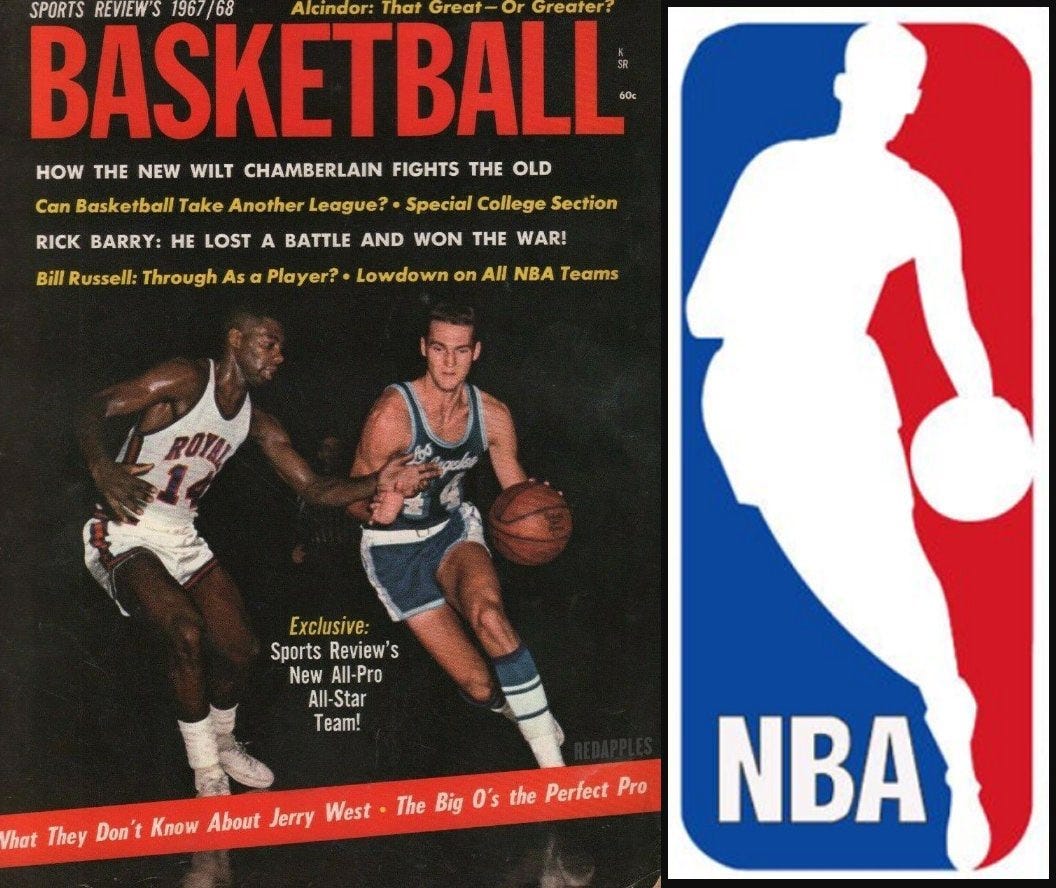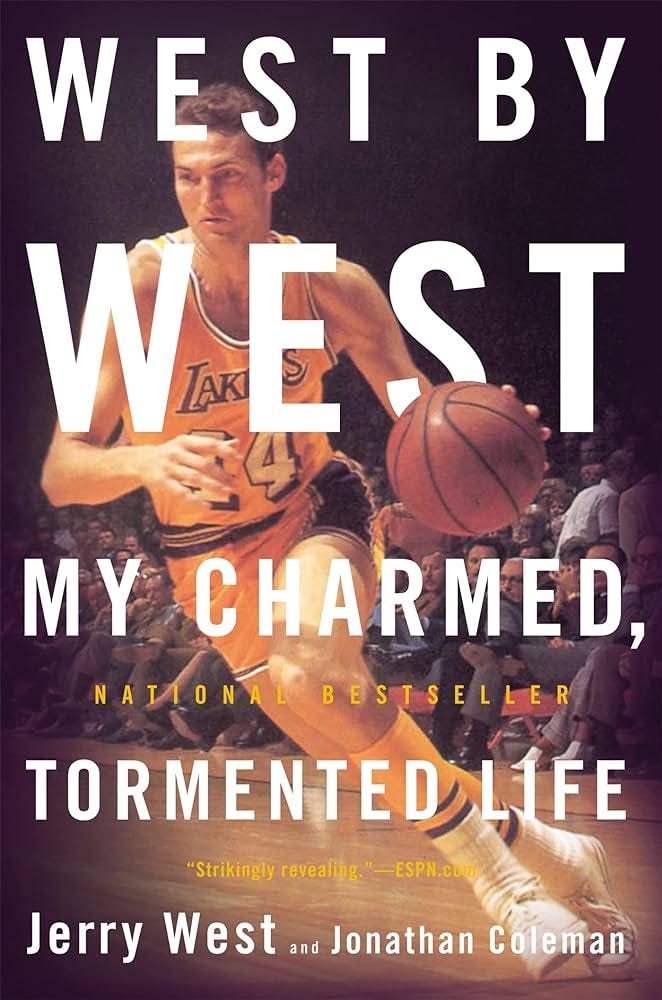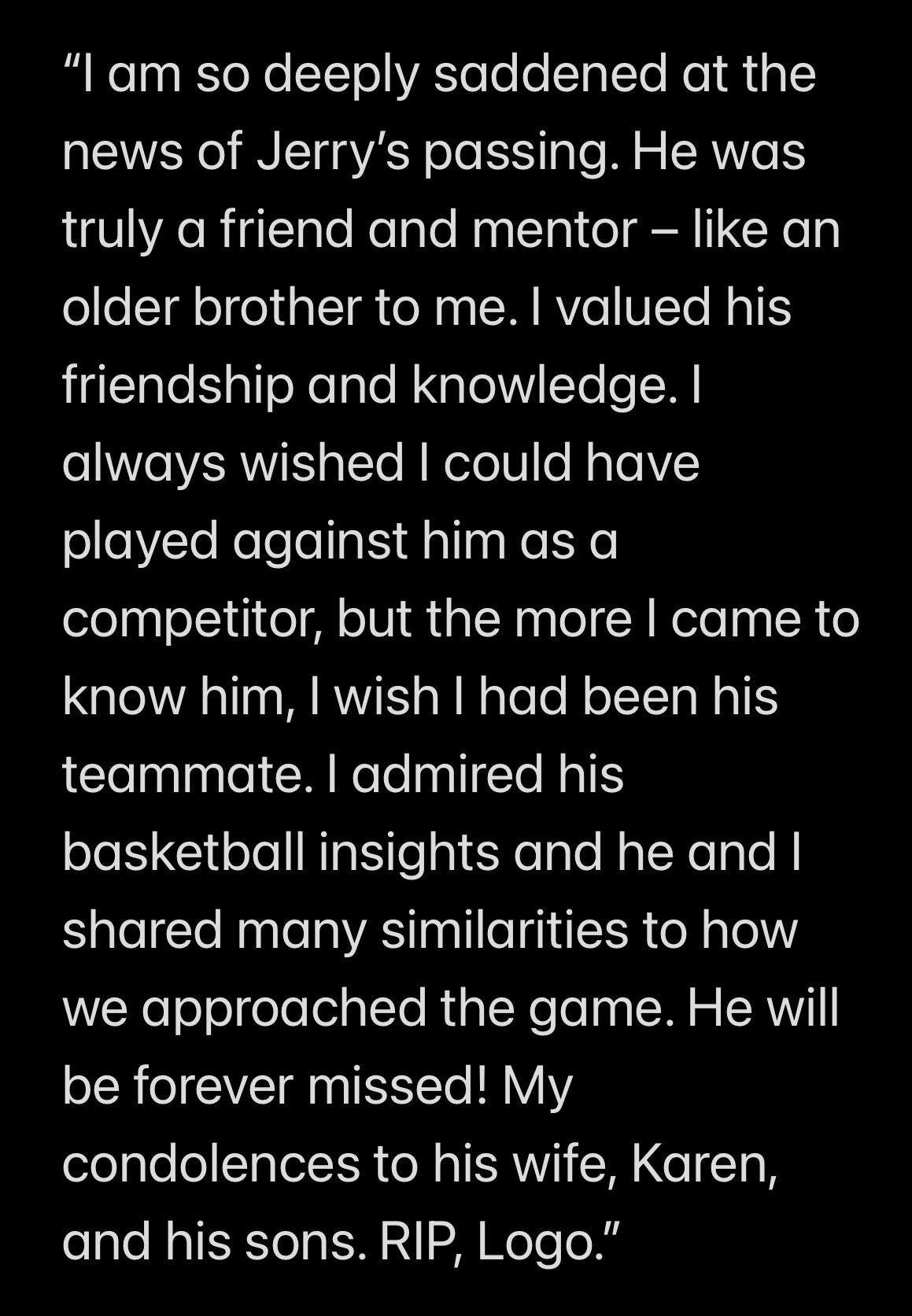The Logo Immortal
Jerry West has been an NBA force of nature since he debuted as a Laker in 1960. Covering half of his unforgettable ride left me with more stories than I can stuff into this attempt to pay homage
It was, or so I thought, one of the smartest lines I had come up as a writer still in my 20s.
I had the temerity to refer to Jerry West in print as Jerry Stressed.
In my second season as a Lakers beat writer for The Los Angeles Daily News, I was not nearly as familiar as I should have been with West's difficult upbringing in West Virginia and the lingering agony from his nine trips to the NBA Finals as a player that resulted in eight defeats. All I cared about was being the first in the old Forum press room to print the rhyme. I couldn't understand why West seemed so dissatisfied — so gloomy and hard to please — so soon after what might have been the greatest back-to-back moves that any professional sports executive had ever strung together.
On draft night in 1996, West worked out a trade with the Charlotte Hornets for a 17-year-old named Kobe Bryant after successfully scaring off several teams that wanted to draft Bryant but feared he might flee to Italy instead. A few weeks later, West had successfully convinced Shaquille O'Neal to leave the Orlando Magic in free agency and relocate to Tinseltown to form a dynamic duo with Bryant that would finally enable the Lakers to move past the shadow of Showtime and Magic Johnson's stunning retirement in November 1991.
Yet the early days of Shaq and Kobe were filled with tension and unmet expectations and self-induced pressure on West that he just kept heaping on himself. It still made little sense to me that he could seem so outwardly unfulfilled all the time when he was routinely referred to by everyone in our profession as the best GM in basketball even before he pulled off his double swoop for Bryant and O'Neal. But that's because I was still a young scribe who hadn't been around long enough and hadn't done enough studying. I didn’t see the whole picture. I didn't understand that West, by that point in his life, had become too consumed by winning.
It was also years before West himself would let us all on in the depths of his bouts with depression, going all the way back to his youth and the devastating effects of living in poverty with an abusive father and losing his older brother David in 1951 in the Korean War. It all came out in the hauntingly titled autobiography co-written with Jonathan Coleman in 2011 — West by West: My Charmed, Tormented Life.
West was wounded by the Jerry Stressed jab and I naturally felt sick about it when it emerged that he had to be hospitalized — twice — because of exhaustion caused by the rigors of job. Yet West never said a word about what I had written directly to me; I had only heard through intermediaries that he had found it upsetting.
Even better for me: Across the ensuing quarter-century, West acted like it never happened.
And then, as we gradually got to know each other better, West became the NBA figure who I most looked forward to speaking with any chance I got.

If he knew you and saw you at a game, there would be no-holds-barred candor that he initiated about whatever was happening with his team or around the league at the time. He loved league gossip and, for all the stories former Lakers beat writers delight in sharing about West unloading on them for a story or headline he hated — my longtime colleagues Howard Beck and Tim Kawakami do it beautifully in their remembrance pieces — West made himself endlessly available to reporters. A call to the Lakers' offices and a message left in pre-mobile phone times with his assistant Mary Lou was always returned swiftly ... even if the conversation was bound to be uncomfortable.
"Marc … this is Jerry West."
I will never forget what that sounded like when the phone rang and how much I enjoyed hearing it.
Yet that's just a selfish remembrance. Most of all, West oozed a care factor, competitiveness and intensity, well into his 80s, that even Michael Jordan envied. Think about that. It's something you could plainly pick up on as soon as you read Jordan's moving statement Wednesday after it was announced that West had died at age 86:
The greats, like MJ and Kobe and LeBron James, wanted to be in West's company and talk with him as much as pesky scribes like me and so many others around the league did. I heard Brian Windhorst tell the story on TV of LeBron, after his woeful performance in a 2011 NBA Finals defeat to Dallas, calling West for advice on how to rebound from failing on the game's foremost stage. He has been a giant in the game for six decades in part because stars never stopped seeking his counsel.
The stat circulated Wednesday that West ridiculously has a direct connection to 30 of the 75 NBA Finals series in league annals. You could certainly argue that Magic and Kareem Abdul-Jabbar and Shaq and Kobe were better players, but the greatest Laker of all-time? West helped put the franchise on the map in Los Angeles alongside Elgin Baylor in the 1960s and played a critical role in building the best championship teams they ever had, from the Showtime Lakers of the 1980s to the threepeat team in the early 2000s.
The fact, mind you, that he has been increasingly estranged from the Lakers for more than two decades, ever since walking away from the franchise after the first championship of the Shaq-and-Kobe threepeat in 2000, is yet another deeply sad chapter in West's story that The Los Angeles Times' Bill Plaschke captured well.
It's complicated and often is with Mr. Clutch. Once again: Think about that. How clutch do you have to be to get that nickname with a 1-8 record in the Finals?
West stunningly resurfaced in Memphis after leaving the Lakers to help make the Grizzlies relevant in a brief interlude far too often overlooked. Then in recent years, as a high-level adviser to ownership with both the Warriors and the Clippers, West was still oozing that care factor, defying both age and reason.
What, honestly, did he have left to prove? He simply couldn't stay away. West's never-satisfied, glass-half-empty, have-to-do-better-tomorrow mindset will remain an endless source of storytelling among colleagues and friends.
"Jerry could hit a hole-in-one and complain about how the ball rolled into the hole," Walter Lack, an L.A.-based civil trial lawyer who played gin with West at his Bel-Air Country Club golf haven for many years, once told me.
Warriors vice president of communications Raymond Ridder has
absorbed countless West eruptions and lamentations over the years, going all the way back to the early 1990s when Ridder broke in with the Lakers. Widely regarded as one of the most diligent and tireless workers in his field, Ridder finds himself wondering to this day if he's pushing as hard as he imagines West would expect.
"The year we went 73-9, you'd have thought we were 9-73 based on the number of phone calls," Ridder says now. "But that's what makes him great — his pursuit of perfection."
Some of you probably remember how angry I was about HBO's portrayal of West in its recent Winning Time docuseries. I was hardly alone in my dismay that West's intensity and behind-the-scenes profanity were twisted to make him look like an unhinged rageaholic when, in truth, he had largely taken life's frustrations out on himself.
How I explained it in March 2022:
He is a tightly wound and tortured perfectionist whose chronic unhappiness and hypercompetitiveness has been written about for decades. Every former beat writer who covered him, long before my two seasons traveling with the Lakers in the mid-1990s, has stories of West erupting on them at some point. ... Yet the West presented in Winning Time was absurdly, embarrassingly one note and left out any hint of the wisdom, leadership and charm that made him a franchise pillar for decades and one of the greatest Lakers ever.
In public, West has always been absolutely regal — expertly attired, not a single hair out of place, instant electricity and stature flooding into any room he entered. As a GM, above all, he was confident and made moves with conviction. So the worst part of Winning Time's West, to me, is that younger fans of the Lakers and the broader NBA who were too young for Showtime in real time are bound to think Jason Clarke's portrayal of a violently angry and (even worse) indecisive West was authentic. It wasn't close.
The first time I spoke to him was in 1989 when, after begging The Orange County Register to be their summer league correspondent while still in college, I was informed by an editor that I would have to call West at home to seek comment on a wire story containing threats by the then-Yugoslavian army not to let Vlade Divac join the Lakers. This was right after West, in classic West-ian fashion, had ignored everyone else in the front office who wanted to make a traditional pick from the college ranks to select Divac at No. 26 overall.
Just the thought of calling him at his home, on a Saturday if I'm remembering right, still leaves me trembling.
My last conversation with West will stay with me forever, too. At summer league last July in Las Vegas, Ridder and I lobbied him to meet up with us as a trio and interact like we once did. We were all leaving Vegas on the same day and convinced him to huddle in the lobby at West's hotel for two hours — maybe three. Raymond and I were giddy, once again, to experience The Full Jerry.
West was open about his failing health and inevitably shared some fatalistic thoughts that had me fearing, on the inside, that this would indeed be the last time for a summit like this. As West headed out the hotel's doors to catch his ride to the airport, Ray ran after him to try to get his attention one more time. Many of us get more sentimental as we get older and it hit him that this moment would have been ideal to record for posterity with a picture.
No chance. No sentimentality allowed with West. He pretended (I think) not to hear anything and hurriedly shut the door so the car could speed off.
One last conversation with Mr. Clutch would have to be enough. And we were indeed so grateful for it.
I realize you probably wanted this week's focus to be on the NBA Finals that are happening in my city. I also know you want to dig further into the Lakers' coaching search that has seemed so circus-like since Dan Hurley turned Hollywood's team down to stay at UConn.
Promise: We will get back to those topics ASAP.
I just have to confess that, since we got the news of his passing hours before the first Finals game in Dallas in 13 years, I have thought of little else but West and how fortunate I've been to have covered (and conversed with) him for three decades. I genuinely needed more than a day to try to assemble something West-worthy.
I simply hope now that the NBA sticks with West's silhouette as the league's logo for as long as possible because it so aptly memorializes his unmatched legacy in this game: The most complete career in basketball history.
Keeping the NBA shield as is?
It would be a fitting, enduring and charming tribute to The Logo after more than enough stress and torment.






Beautiful piece. Many (maybe most?) people who had suffered such an abusive, love-deprived childhood grow up to be nasty, abusive adults who take their trauma out on others. West, by all accounts (including this one), took it out on himself, to his detriment but to the benefit of everyone else.
Walton and now West... two of the greatest ever!